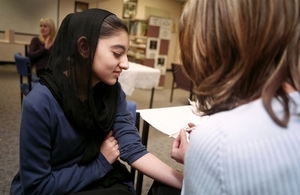Decline in whooping cough cases continues
PHE publish whooping cough (pertussis) figures which are on a decline across England.

MMR vaccination
There were 4,623 laboratory confirmed cases of whooping cough (pertussis) in England in 2013, 51% fewer cases than in 2012 when 9,367 cases were reported, according to annual figures published today by Public Health England (PHE).
Case numbers in infants under 3 months have proportionally seen the greatest reduction, with 79% fewer cases in 2013 (85 cases) than in 2012 (407 cases). There were 3 deaths in infants with whooping cough confirmed in 2013, compared to 14 deaths in 2012.
In September 2012 the Department of Health announced a temporary vaccination programme for pregnant women in response to an ongoing whooping cough outbreak. Pregnant women have been offered the whooping cough vaccine between 28 and 38 weeks of pregnancy since 1 October 2012. Vaccinating against whooping cough in pregnancy enables the mother to transfer a high level of whooping cough antibodies (immunity) to her unborn child. This is to protect their baby against disease from birth until they receive their first dose of vaccine at 2 months of age.
Latest vaccine uptake figures in pregnant women show that around 60% have received their vaccination.
PHE’s head of immunisation, Dr Mary Ramsay, said:
The continued reduction in cases of whooping cough in young infants is welcome news, but unfortunately we still confirmed the infection in 3 babies who died in 2013. The babies were too young to have been vaccinated themselves and none of their mothers had been vaccinated in pregnancy.
The increase in vaccine uptake over the last 6 months is very encouraging but we need to ensure we vaccinate as many pregnant women as possible to avoid further tragic deaths. Although we have also seen a decline in cases in older children and adults between 2012 and 2013, the numbers still remain considerably higher than in 2011 suggesting that the infection is still circulating.
While the infection remains at such high levels we are urging pregnant women to ensure they are vaccinated between 28 and 38 weeks of pregnancy. We are also working with GPs, midwives and other health professionals to ensure they have the facts at hand to help women make the decision to vaccinate.
Whooping cough affects all ages and is highly infectious. Young infants are at highest risk of severe complications and death from whooping cough as babies do not complete vaccination until they are around 4 months old. In older children and adults whooping cough can be an unpleasant illness but it does not usually lead to serious complications.
Dr Ramsay, continues:
Parents should also be alert to the signs and symptoms of whooping cough – which include severe coughing fits which may be accompanied by difficulty breathing (or pauses in breathing in young infants) or vomiting after coughing and the characteristic “whoop” sound in young children or may present as a prolonged cough in older children or adults.
Parents must also ensure their children are vaccinated against whooping cough on time, even babies of women who’ve had the vaccine in pregnancy – this is to continue their baby’s protection through childhood.
Notes to editors
- Read the health protection report
- Read the full regional, age and sex breakdown of confirmed whooping cough cases in 2013
- Public Health England’s mission is to protect and improve the nation’s health and to address inequalities through working with national and local government, the NHS, industry and the voluntary and community sector. PHE is an operationally autonomous executive agency of the Department of Health.
www.gov.uk/phe Follow us on Twitter @PHE_uk
UKHSA press office: National Infection Service
UKHSA press office, infectious diseases
61 Colindale Avenue
London
NW9 5EQ